Coronavirus: The junior US doctors rushing to the frontlines
- Published
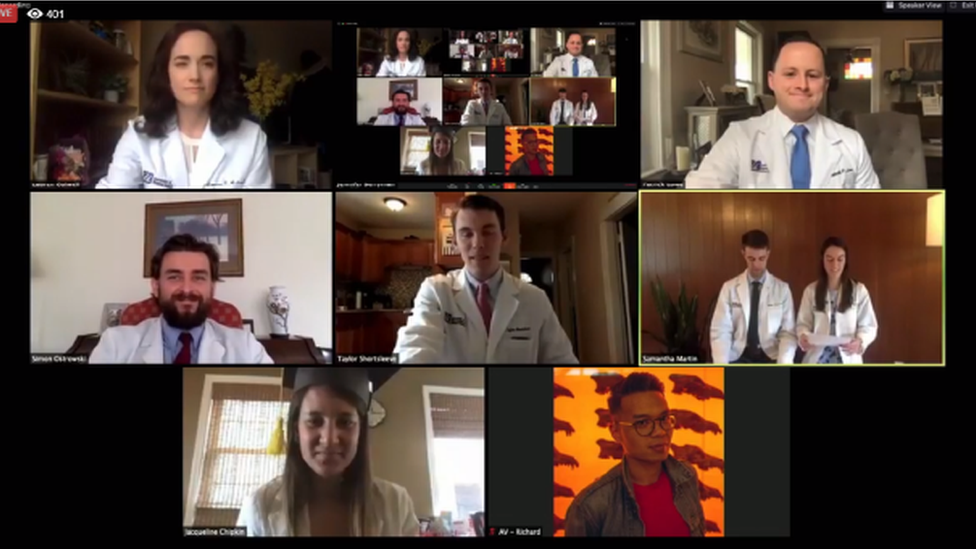
New doctors recited the Hippocratic Oath over Zoom at their graduation
Doctors now finishing at US medical schools are seeing their graduation dates moved forward in the calendar and are quickly being drafted into the battle against the coronavirus pandemic before the ink on their diplomas is dry.
With his white coat freshly pressed and his webcam poised, Patrick Lowe was ready for his graduation from medical school.
On Zoom, he recited his class' personalised version of the Hippocratic Oath. And in lieu of receiving his physical diploma from the University of Massachusetts, he shook his wife's hand and gave his six-month old son, Jack, a hug.
"It's been a bit of whirlwind," he told the BBC. "It's all pretty surreal, but also exciting."
The Covid-19 outbreak meant that a traditional graduation ceremony was out of the question, but the University of Massachusetts wanted to ensure that the class of 2020 was able to commemorate their achievement.
As a result, the university conferred 135 medical degrees in an online event streamed online for friends and family to watch.
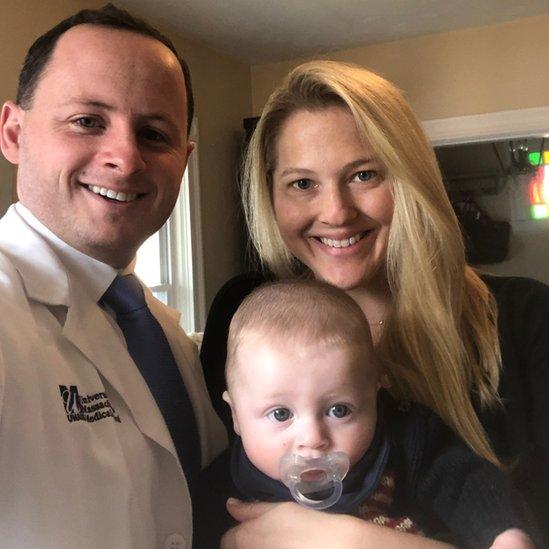
Patrick Lowe, his wife Jaclyn and son Jack, after his virtual graduation
Lowe and his classmates were originally meant to graduate on 31 June, and begin their respective residencies soon after. The time in between finishing up classes and graduation is usually when students brush up on their training and recuperate before starting their medical career in earnest.
"Some use it as vacation time," Lowe explains.
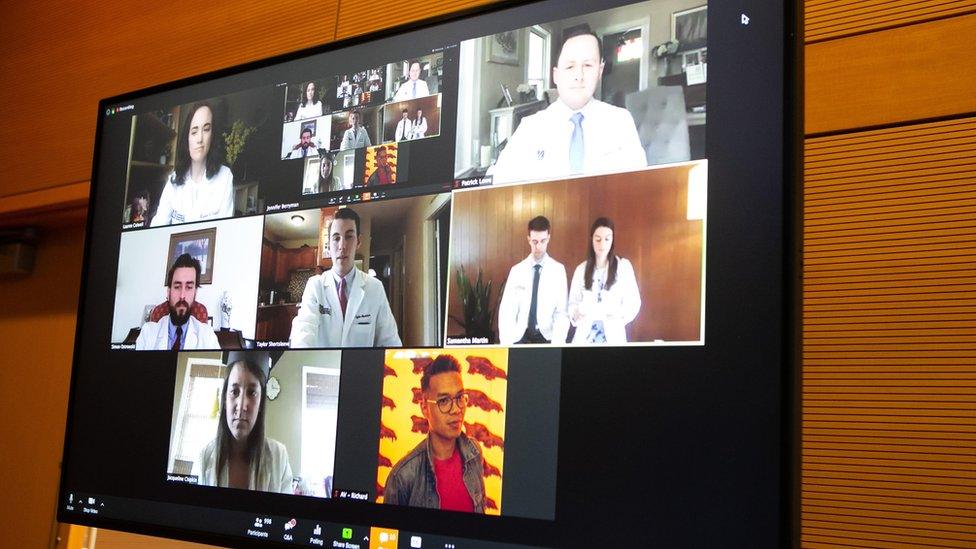
However, for the class of 2020, there wasn't much time to rest. As medical licences are expedited by the state, nascent doctors have been rushed to fill the gaping demands caused by the coronavirus.
The University of Massachusetts joined three other medical schools in the state - Tufts University, Boston University and Harvard University - to accelerate their students' graduation, and allow them to enter the medical workforce immediately.
Lowe swiftly started working on the general medicine ward at the University of Massachusetts Hospital. He deals with patients coming to hospital with conditions that are not coronavirus-related.
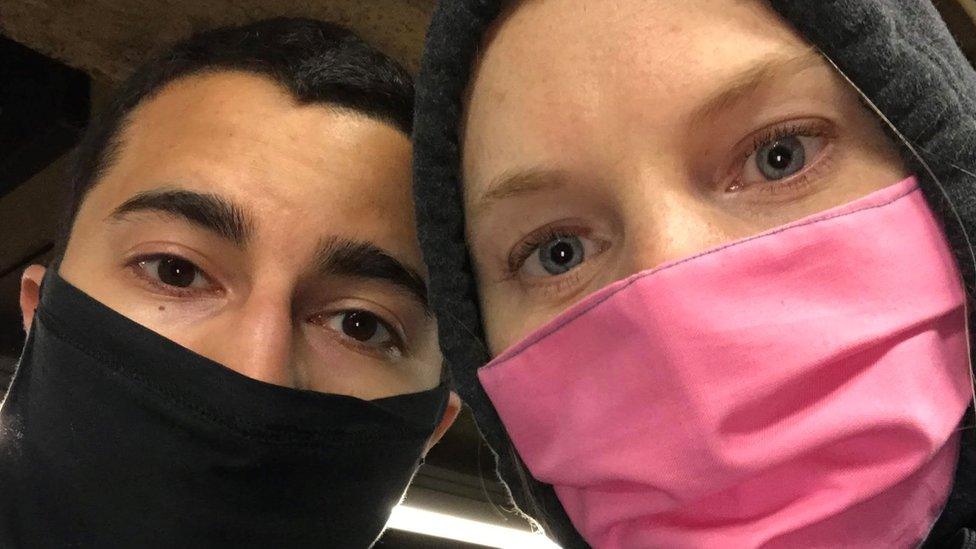
Brandon Mogrovego is volunteering to build PPE before he starts work as a paediatrician-in-training
The aim of the acceleration is to recruit junior doctors who can handle these cases, and ultimately free up more senior residents and doctors to handle the influx of Covid-19 patients.
"I feel I'm helping the system work more efficiently," Lowe told the BBC. "I'm just one piece of the huge puzzle."
At their virtual graduation, Terence R Flotte, the dean of the medical school, told the graduating class that "never before have we needed you more to join our ranks as healers and leaders of health care teams".
This attitude is certainly felt among graduating students.
Colleen Flanagan says she was "thrilled to have the opportunity to work". She is one of Lowe's classmates, and has spent the past three weeks working in the cardiac intensive care unit at the UMass Memorial Medical Center.
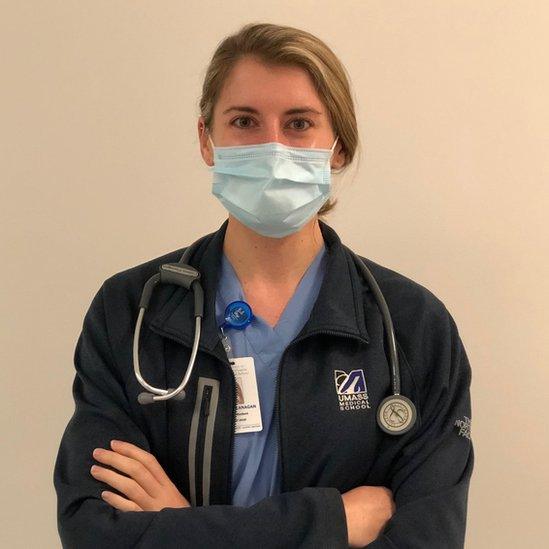
Colleen Flanagan says she is "thrilled" to begin work
Flanagan is due to move to San Francisco in June to begin her residency in vascular surgery. Since she was unable to spend the interim period saying goodbye to her loved ones, she felt getting on the ward in Massachusetts was imperative.
"I had no interest in sitting around at home," she tells BBC News. "I was ready to help."
Flanagan explained that many patients with non-Covid conditions are choosing to stay home, but coming to the hospital at a stage when they're presenting symptoms more severely.
"It's heartbreaking to see someone who had a five-day old heart attack, but they didn't want to risk it," she says.
"We say 'time is tissue,'" she added.
Flanagan noted that while these issues can be devastating, they can also be helped if they are treated as soon as possible. She is ultimately concerned that the strain caused by Covid-19 might lead to a number of deaths at home because people are too scared to come to the hospital.
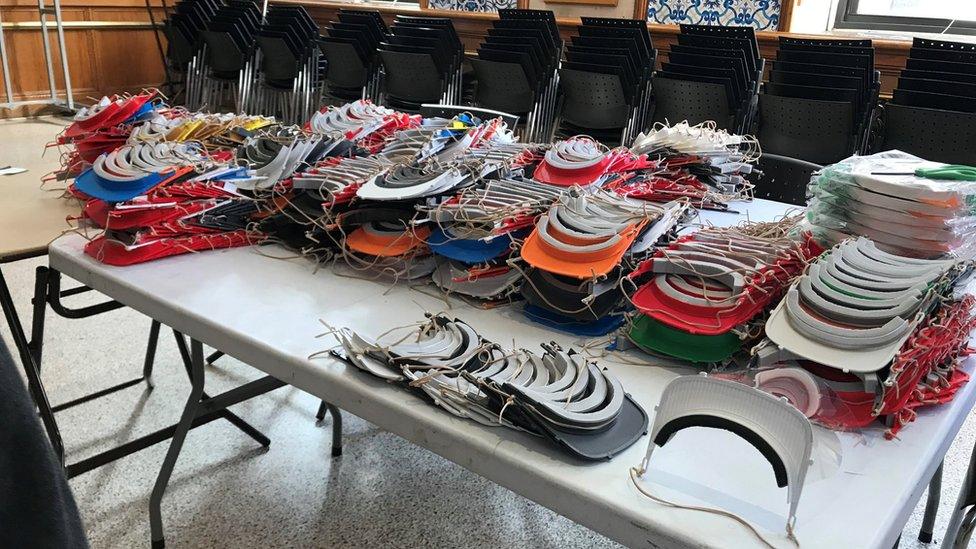
Brandon Mogrovejo and his wife volunteered to make PPE for New York medical workers
In New York City, medical students also graduated early to assist with the inundation of coronavirus cases. There are currently over 150,000 confirmed cases of Covid-19 in the city, according to John Hopkins University.
For students like Brandon Mogrovejo at Columbia University this work has even included using 3D printers to make and assemble PPE (personal protective equipment) for medical workers throughout the city.

A SIMPLE GUIDE: What are the symptoms?
LEADING THE WAY: How California kept ahead of the curve
ON FRONTLINE: The young doctors being asked to play god
FACTORY HOTSPOT: The untold story behind America's biggest outbreak
REASON TO HOPE: The good that may come out of this crisis

Mogrovejo was due to begin his residency as a paediatrician-in-training in June at Morgan Stanley Children's Hospital, but is volunteering in the meantime.
"It's so tangible," he said. "I look at the masks piling up on the table and you know that will be going to the frontline."
While Mogrovejo was initially apprehensive about how his graduating class were going to prove useful, he soon realised that volunteer work meant he was still able to make a difference.
"Part of the reason I got into this line of work was because I wanted to help people in need," he said.
"This is part of my calling."